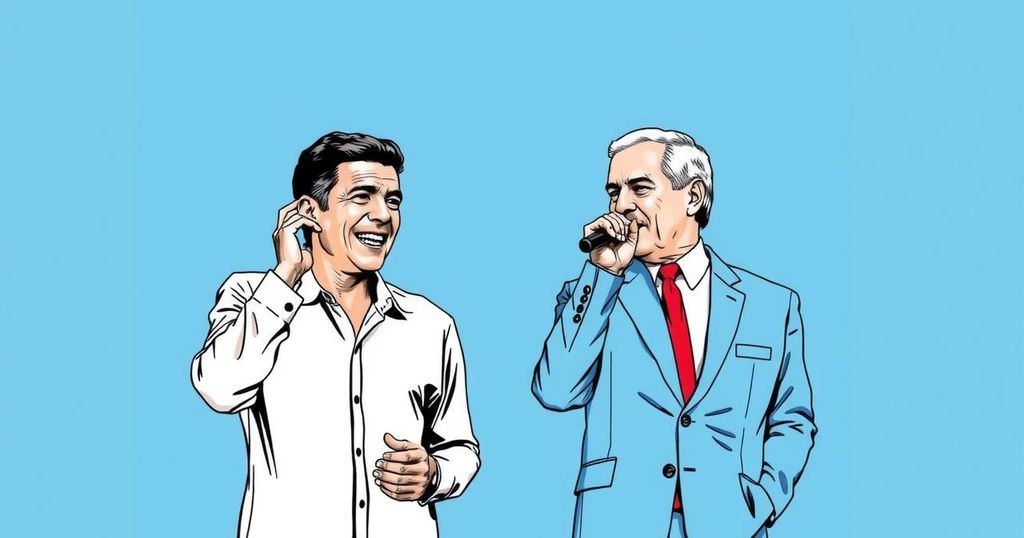Uruguay’s Presidential Race: A Runoff Set Amid Political Stability and Social Concerns

Uruguay’s presidential election heading for a runoff on November 24, with preliminary results showing the leftist alliance led by Yamandú Orsi ahead of conservative Álvaro Delgado. The election focuses on pressing issues such as crime and child poverty, reflecting a different political climate compared to Brazil and Argentina. The turnout reached 89%, showcasing Uruguay’s commitment to democratic participation.
In a notable turn of events during Uruguay’s presidential election held on Sunday, preliminary results indicated that the small South American nation is set for a runoff on November 24. With over 60% of ballots counted, the leftist alliance led by former mayor Yamandú Orsi appears to be ahead of the ruling conservative coalition, represented by candidate Álvaro Delgado. This development comes amidst a backdrop of political stability and compulsory voter turnout in Uruguay, which registered an impressive 89% participation out of 2.7 million eligible voters. The election saw both Orsi and Delgado addressing jubilant supporters post-midnight, acknowledging the necessity of a second round to determine the country’s next president. Potentially significant was the fact that while the leftist Orsi was projected to secure approximately 42%-44% of the vote, he fell short of the 50% threshold needed to secure an outright victory. Conversely, Delgado was anticipated to garner around 27-28% of the vote. These figures suggest a more engaged response from the electorate compared to neighboring nations where dissatisfaction with current governments has led to polarized outcomes. The electoral contest has largely focused on pressing social issues, such as rising crime rates and child poverty, with both candidates advocating for different approaches regarding security and welfare. Orsi’s Broad Front coalition, which held power from 2005 to 2019, advocates a stronger state role in societal assistance, a much-needed response in a country where one in five children live in poverty. In contrast, the ruling coalition emphasizes a stern approach to crime. Voters seemed to endorse Orsi’s candidacy due to his relatable background and the promise to represent working-class interests, reminiscent of former president José Mujica’s appeal. Mujica, now battling cancer, remains a popular figure, demonstrating that the past leadership’s legacy continues to influence current political dynamics. While the election has been characterized by relative civility compared to more divisive campaigns in the region, it has occurred alongside a controversial constitutional referendum seeking to reform the nation’s social security system. This issue has overshadowed other campaign matters, although both leading candidates have opposed the referendum due to its projected fiscal implications. As the nation braces for a runoff, the outcome could signal whether Uruguay will revert to the historically dominant center-left coalition or maintain the current center-right administration, leading to an undeniable reconfiguration of political power in the region.
Uruguay has historically been recognized as a model democracy in Latin America, demonstrating political stability and a commitment to high voter engagement. With elections mandated by law, the significant turnout rate underscores the electorate’s investment in the democratic process. The current electoral contest comes at a time when regional sentiments have shifted drastically, particularly in countries like Brazil and Argentina, where voters have expressed dissatisfaction through polarized selections. In Uruguay, however, the election reflects a nuanced political landscape where candidates prioritize social issues such as crime rates and poverty, indicating a balance between societal aspirations and political realities.
The Uruguay presidential election results signal an upcoming runoff that reflects a distinct political environment, contrasting sharply with trends seen in neighboring nations. Candidates Orsi and Delgado encapsulate a broader debate concerning social responsibility and governance amidst urgent societal challenges. As the nation approaches the final voting round, the focus will likely intensify on the contrasting visions presented by the candidates, with lasting implications for Uruguay’s political future.
Original Source: www.firstpost.com







